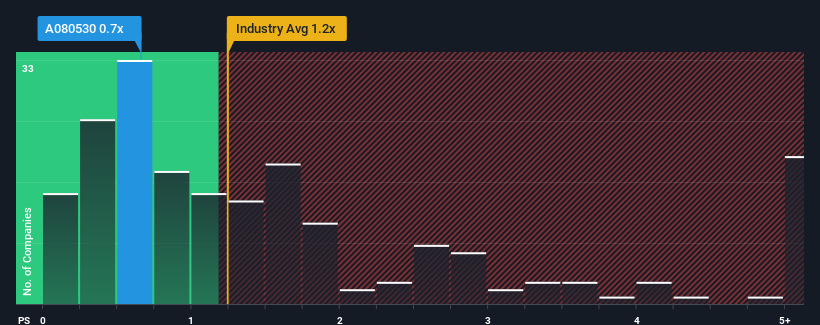- South Korea
- /
- Personal Products
- /
- KOSDAQ:A080530
KODI CO., LTD's (KOSDAQ:080530) 25% Dip In Price Shows Sentiment Is Matching Revenues
To the annoyance of some shareholders, KODI CO., LTD (KOSDAQ:080530) shares are down a considerable 25% in the last month, which continues a horrid run for the company. Longer-term shareholders would now have taken a real hit with the stock declining 8.9% in the last year.
Since its price has dipped substantially, when close to half the companies operating in Korea's Semiconductor industry have price-to-sales ratios (or "P/S") above 1.2x, you may consider KODI as an enticing stock to check out with its 0.7x P/S ratio. However, the P/S might be low for a reason and it requires further investigation to determine if it's justified.
See our latest analysis for KODI

How KODI Has Been Performing
The revenue growth achieved at KODI over the last year would be more than acceptable for most companies. One possibility is that the P/S is low because investors think this respectable revenue growth might actually underperform the broader industry in the near future. If that doesn't eventuate, then existing shareholders have reason to be optimistic about the future direction of the share price.
Although there are no analyst estimates available for KODI, take a look at this free data-rich visualisation to see how the company stacks up on earnings, revenue and cash flow.Is There Any Revenue Growth Forecasted For KODI?
There's an inherent assumption that a company should underperform the industry for P/S ratios like KODI's to be considered reasonable.
Retrospectively, the last year delivered an exceptional 15% gain to the company's top line. The strong recent performance means it was also able to grow revenue by 46% in total over the last three years. So we can start by confirming that the company has done a great job of growing revenue over that time.
Comparing that to the industry, which is predicted to deliver 62% growth in the next 12 months, the company's momentum is weaker, based on recent medium-term annualised revenue results.
With this in consideration, it's easy to understand why KODI's P/S falls short of the mark set by its industry peers. It seems most investors are expecting to see the recent limited growth rates continue into the future and are only willing to pay a reduced amount for the stock.
What We Can Learn From KODI's P/S?
KODI's P/S has taken a dip along with its share price. Typically, we'd caution against reading too much into price-to-sales ratios when settling on investment decisions, though it can reveal plenty about what other market participants think about the company.
Our examination of KODI confirms that the company's revenue trends over the past three-year years are a key factor in its low price-to-sales ratio, as we suspected, given they fall short of current industry expectations. Right now shareholders are accepting the low P/S as they concede future revenue probably won't provide any pleasant surprises. Unless the recent medium-term conditions improve, they will continue to form a barrier for the share price around these levels.
You should always think about risks. Case in point, we've spotted 3 warning signs for KODI you should be aware of, and 1 of them is a bit concerning.
If these risks are making you reconsider your opinion on KODI, explore our interactive list of high quality stocks to get an idea of what else is out there.
Valuation is complex, but we're here to simplify it.
Discover if KODI might be undervalued or overvalued with our detailed analysis, featuring fair value estimates, potential risks, dividends, insider trades, and its financial condition.
Access Free AnalysisHave feedback on this article? Concerned about the content? Get in touch with us directly. Alternatively, email editorial-team (at) simplywallst.com.
This article by Simply Wall St is general in nature. We provide commentary based on historical data and analyst forecasts only using an unbiased methodology and our articles are not intended to be financial advice. It does not constitute a recommendation to buy or sell any stock, and does not take account of your objectives, or your financial situation. We aim to bring you long-term focused analysis driven by fundamental data. Note that our analysis may not factor in the latest price-sensitive company announcements or qualitative material. Simply Wall St has no position in any stocks mentioned.
About KOSDAQ:A080530
KODI
Manufactures and sells cosmetics and cosmetic containers in South Korea.
Excellent balance sheet with low risk.
Market Insights
Community Narratives



